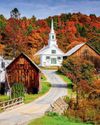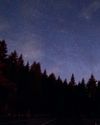
Switzerland certainly isn't shy about stepping forward when it comes to its great outdoors. Its cow-strewn meadows, 4,000m-high peaks and glacier-fed lakes dominate the many tourist brochures, but there's one feature that still comes as a surprise to many visitors: its vineyards.
There are six wine-growing regions in the country, with around 2,500 winemakers producing 100 million litres of wine annually. But since only about 1% of this wine is exported, it remains little known outside the country, leaving the Swiss to - rather happily-drink most of it themselves. It's no surprise that Switzerland was named the world's fourth-largest wine consumer per capita in 2021.
One of the oldest wine-growing areas in the country is Lavaux, in the region of Vaud. It spans a 30km stretch of vineyards and occupies the slopes above Lac Léman (Lake Geneva) between Lausanne and Montreux. Formed by the retreat of the Rhône glacier 15,000 years ago, this land is so steep that it was once considered unusable, until canny Cistercian monks decided to build terraces to shore up the soil in the 12th century.
The best view of the area is from a ferry on the water. From there you can trace the undulating stone walls that run roughly parallel to the lakeshore; these follow the landscape like contour lines on a map, with row upon row of vines occupying the spaces between them. Tiny, red-roofed villages and wineries are dotted throughout. It's a fine example of man and nature working in harmony - a sentiment echoed by UNESCO when it inscribed Lavaux onto its World Heritage List in 2007. Its official description praised the area's 'centuries-long interaction between people and their environment. The reality is so much more captivating in person.
Diese Geschichte stammt aus der August/September 2023-Ausgabe von Wanderlust Travel Magazine.
Starten Sie Ihre 7-tägige kostenlose Testversion von Magzter GOLD, um auf Tausende kuratierte Premium-Storys sowie über 8.000 Zeitschriften und Zeitungen zuzugreifen.
Bereits Abonnent ? Anmelden
Diese Geschichte stammt aus der August/September 2023-Ausgabe von Wanderlust Travel Magazine.
Starten Sie Ihre 7-tägige kostenlose Testversion von Magzter GOLD, um auf Tausende kuratierte Premium-Storys sowie über 8.000 Zeitschriften und Zeitungen zuzugreifen.
Bereits Abonnent? Anmelden

Vermont, USA
The Wanderlust team relocated to New England for part of this issue, as we explored a lush state filled with outdoor escapes, historic towns... and lashings of maple syrup

Unique North America
See a side to the USA and Canada beyond the big cities and discover incredible stories and special wildlife with our pick of the trips

The call of the Rockies
From historic ski lodges to rustic backcountry cabins and a mock-Scottish castle, we pick the stays in Canada's Rocky Mountains that make the most of their setting

A new dawn for the Garifuna community
When the Garifuna people settled in Belize, they had to carry their traditions and culture with them; now a new trail is inviting visitors to explore this heritage through local communities

On the edge of history
In south-west Colorado lies the largest archaeological preserve in the USA, a series of vast cliff dwellings whose residents 'vanished' overnight. But was the answer to their disappearance in plain sight?

Tigers burning bright
As India celebrates 50 years of its Project Tiger conservation scheme, we visit the reserves of Madhya Pradesh to see how its success has impacted a tiger population that once looked in danger of disappearing

SEASON'S GREETINGS
From fiery fall foliage to art fairs and harvest festivals, opens up a wealth of across the USA and Canada autumn experiences

Waking a sleeping GIANT
A slow drive along the North Wales Way, from the English border to Anglesey, reveals not only a land of incredible local food and castles, but a region that is slowly reimagining itself

The rebirth of old JEDDAH
As efforts to restore Al-Balad, Jeddah's historical district, take hold, we get an exclusive peek at how art and culture are taking centre stage

Star-studded escapes
Wilderness, history and wildlife combine at some of Britain's most iconic stargazing sites, as more and more travellers are looking to the heavens